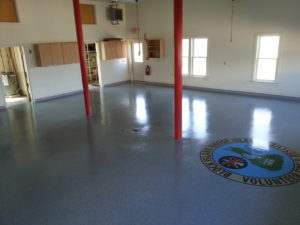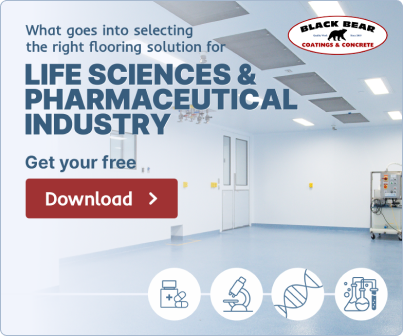
Epoxy vs. Vinyl Flooring: DURABILITY
Epoxy flooring can withstand the toughest stressors including high heat, water, chemicals, and even bacteria. It has a longer lifespan than most other types of flooring and provides greater value in the long run. With proper engineering and additives, epoxy floors protect the concrete substrate from cracks, moisture, grease, and stains.
On the other hand, vinyl flooring can rip and tear easily. This can be a detriment if water permeates the product and causes mold, mildew, and bacteria to form. Even if the floor remains intact, seepage can occur through the seams. Sunlight will fade vinyl flooring, and mats and overlays with rubber backings are not recommended due to the rubber causing discoloration of the floors faster.
Epoxy vs. Vinyl Flooring: MAINTENANCE
Maintaining your floors will add to the longevity and cleaning and sanitizing epoxy floors is a breeze. The smooth surface helps protect against spills and stains, and routine cleaning requires little more than a broom. It can last for decades without peeling or cracking.
Vinyl flooring, however, can be damaged by commercial cleaning products causing your floor to lose its sheen. If it’s exposed to frequent traffic, the recommended pH-neutral cleaning products are not able to keep up with the amount of tracked-in dirt. It then becomes necessary to strip and polish the flooring, which can be a difficult and time-consuming procedure.
Epoxy vs. Vinyl Flooring: SAFETY
Epoxy coatings can be formulated for extra slip resistance and extreme impact. With low/no VOC options they can minimize hazards in the workplace that result in millions of dollars in damages and lawsuits for businesses. Also, it is an environmentally friendly/green floor that is energy efficient and can reduce waste during installation.
Conversely, vinyl flooring goes through an outgassing process that releases toxic chemicals into the air that can lead to health issues. As a non-biodegradable floor product, it creates ecological waste which does not meet green build standards.
Epoxy vs. Vinyl Flooring: COST-EFFECTIVENESS
As previously mentioned, epoxy flooring is an energy efficient product that can minimize overhead costs. It’s a highly reflective floor which adds light to the area, allowing you to lower your electric costs by reducing the number of lights in use on a regular basis.
Vinyl flooring cannot be refinished. It must be removed and replaced when any damage is incurred. This not only adds to the downtime and disruption to business but requires more out of pocket costs to replace the floor system.
Black Bear Commercial & Industrial Epoxy Solutions
Black Bear Coatings & Concrete, the industrial flooring experts, has over 25 years’ of combined expertise engineering and installing flawless epoxy solutions. Our team is the trusted professional in this niche industry. We value-engineer flooring solutions based on the environmental factors that could impact the longevity of your floor. This provides a longer-lasting product. Our pioneering installation techniques that result in industry standard ensures a timely, accurate delivery that minimizes disruption in operations and keeps the focus on your business.
Contact us directly for more information about our epoxy, urethane, polished concrete, and MMA flooring solutions. Request a free, on-site assessment to learn how Black Bear can provide a compliant, visually appealing, and durable floor for your business.



